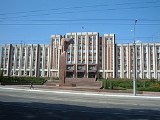
Transnistrian Supreme Soviet
Encyclopedia
The Supreme Council of the Transnistrian Moldovan Republic is the parliament
of Transnistria
. The unicameral legislature
consists of 43 seats, all of which are determined by single mandate constituencies
. It is headed by a chairman (or speaker
).
, but following the election win of opposition party Renewal
the new chairman became Renewal party leader Yevgeny Shevchuk. Both Mărăcuţă and Shevchuk are native-born Transnistrians. On 22 July 2009, Shevchuk resigned as speaker and was succeeded by Russian-born ethnic Ukrainian Anatoly Kaminski, also from the Renewal party. Shevchuk cited the newly proposed constitution as a major factor as to why he resigned.
, part never claimed by Transnistria, 9 were born in the Russian Federation, 8 in Ukraine
, 2 in Kazakhstan
, 1 in Germany, 1 in Belarus
, and 3 did not declare their origin.
Also a list published by the European Union indicates that a majority of the leadership, who are banned from travelling to the EU, were not born in Transnistria.
. One of the current proposals is to introduce a bicameral legislature.
Parliament
A parliament is a legislature, especially in those countries whose system of government is based on the Westminster system modeled after that of the United Kingdom. The name is derived from the French , the action of parler : a parlement is a discussion. The term came to mean a meeting at which...
of Transnistria
Transnistria
Transnistria is a breakaway territory located mostly on a strip of land between the Dniester River and the eastern Moldovan border to Ukraine...
. The unicameral legislature
Legislature
A legislature is a kind of deliberative assembly with the power to pass, amend, and repeal laws. The law created by a legislature is called legislation or statutory law. In addition to enacting laws, legislatures usually have exclusive authority to raise or lower taxes and adopt the budget and...
consists of 43 seats, all of which are determined by single mandate constituencies
Plurality voting system
The plurality voting system is a single-winner voting system often used to elect executive officers or to elect members of a legislative assembly which is based on single-member constituencies...
. It is headed by a chairman (or speaker
Speaker (politics)
The term speaker is a title often given to the presiding officer of a deliberative assembly, especially a legislative body. The speaker's official role is to moderate debate, make rulings on procedure, announce the results of votes, and the like. The speaker decides who may speak and has the...
).
Jurisdiction
Moldova still considers Transnistria part of its territory, although Transnistria declared independence on 2 September 1990. Until 2005, the chairman of the parliament was Grigore MărăcuţăGrigore Maracuta
Grigore Stepanovici Mărăcuţă , - Grigoriy Stepanovich Marakutsa) is a Transnistrian politician and member of Pridnestrovian Supreme Soviet....
, but following the election win of opposition party Renewal
Renewal (Transnistria)
Renewal or Renovation , a pro-business political party in Transnistria. Since the legislative elections of 2005 it is the majority party in the Transnistrian Parliament but in opposition to the current PMR President Igor Smirnov.It was founded as a political NGO in 2000 and campaigned under its...
the new chairman became Renewal party leader Yevgeny Shevchuk. Both Mărăcuţă and Shevchuk are native-born Transnistrians. On 22 July 2009, Shevchuk resigned as speaker and was succeeded by Russian-born ethnic Ukrainian Anatoly Kaminski, also from the Renewal party. Shevchuk cited the newly proposed constitution as a major factor as to why he resigned.
Members of parliament
Most of the members of parliament are not native-born Transnistrians. According to official PMR data, only 15 members of the parliament out of 43 were born on the territory of Transnistria (12 in Transnistria proper, 3 in Bessarabian area of Bender-Chiţcani which is controlled by Transnistria), 4 were born in BessarabiaBessarabia
Bessarabia is a historical term for the geographic region in Eastern Europe bounded by the Dniester River on the east and the Prut River on the west....
, part never claimed by Transnistria, 9 were born in the Russian Federation, 8 in Ukraine
Ukraine
Ukraine is a country in Eastern Europe. It has an area of 603,628 km², making it the second largest contiguous country on the European continent, after Russia...
, 2 in Kazakhstan
Kazakhstan
Kazakhstan , officially the Republic of Kazakhstan, is a transcontinental country in Central Asia and Eastern Europe. Ranked as the ninth largest country in the world, it is also the world's largest landlocked country; its territory of is greater than Western Europe...
, 1 in Germany, 1 in Belarus
Belarus
Belarus , officially the Republic of Belarus, is a landlocked country in Eastern Europe, bordered clockwise by Russia to the northeast, Ukraine to the south, Poland to the west, and Lithuania and Latvia to the northwest. Its capital is Minsk; other major cities include Brest, Grodno , Gomel ,...
, and 3 did not declare their origin.
Also a list published by the European Union indicates that a majority of the leadership, who are banned from travelling to the EU, were not born in Transnistria.
Future
President Igor Smirnov of Transnistria has set up a commission to draft a new constitutionConstitution of Transnistria
The current Constitution of Transnistria was approved by national referendum on 24 December 1995, and signed into law by the President of Transnistria on 17 January 1996. As part of the territory's move towards market based reforms, it was modified on 30 June 2000.The constitution provides for a...
. One of the current proposals is to introduce a bicameral legislature.
List of speakers
- Grigore MărăcuţăGrigore MaracutaGrigore Stepanovici Mărăcuţă , - Grigoriy Stepanovich Marakutsa) is a Transnistrian politician and member of Pridnestrovian Supreme Soviet....
(1990–2005) - Yevgeny Shevchuk (2005–2009)
- Anatoly Kaminski (2009 - current)

